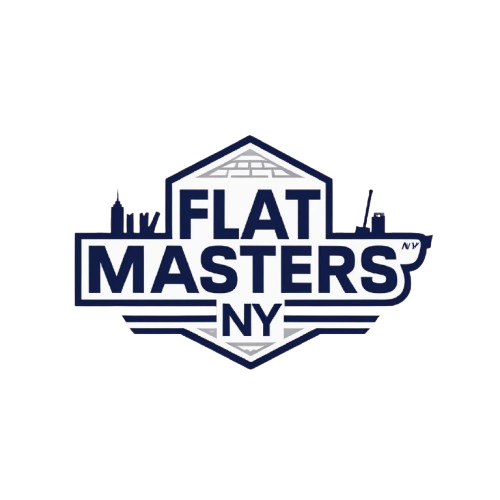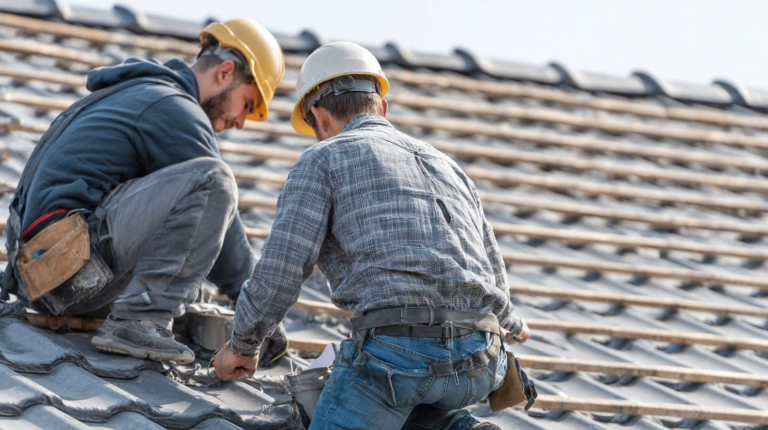Professional Rubber Roofing Systems for Flat Roofs Installation
Look, after installing rubber roofing for flat roofs across Queens for over two decades, I can tell you this material has become the gold standard for commercial buildings and residential flat roof applications. EPDM (ethylene propylene diene monomer) rubber roofing systems deliver unmatched durability in our harsh Northeast climate, and I've seen these systems perform flawlessly for 30+ years when properly installed.
We're seeing more property owners in Astoria, Long Island City, and Flushing switching to rubber flat roofing systems because they understand the long-term value. Just last month on Northern Boulevard, we replaced a failing built-up roof with a premium EPDM system, and the building owner was amazed at how much quieter the building became during heavy rainfall.
Why Rubber Roofing for Flat Roofs Dominates Queens Commercial Buildings
Here's what makes rubber roofing for flat roof applications so effective in our market: the material's molecular structure allows it to expand and contract with temperature fluctuations without cracking or splitting. When you consider that Queens experiences temperature swings from below zero in January to 95+ degrees in July, this flexibility becomes crucial for roof longevity.
The membrane thickness we typically install ranges from 45 mils to 90 mils, depending on the specific application and building requirements. For most commercial applications in Queens, we recommend 60-mil EPDM because it provides the optimal balance of durability and cost-effectiveness.
My crew chief Miguel, who's been with Flat Masters NY for twelve years, always points out how rubber flat roofing systems handle ponding water better than any other single-ply membrane. This matters tremendously here because our flat roofs deal with significant snow loads in winter and intense summer storms that can dump 3+ inches of rain in an hour.
EPDM Installation Process for Queens Properties
The installation of rubber roofing systems for flat roofs requires precise attention to detail, especially given the wind conditions we face near LaGuardia Airport and along the East River waterfront. We start every project with a comprehensive roof deck evaluation because the substrate condition determines the entire system's performance.
For new construction, we install a minimum 1/2-inch ISO board insulation beneath the EPDM membrane, but for retrofit applications, we often encounter existing built-up roofs that need complete tear-off. The decision between mechanical attachment and fully adhered systems depends on building height, local wind loads, and existing deck conditions.
I can't stress enough how critical proper seaming is for rubber flat roofing longevity. We use only factory-approved adhesives and sealants, and every seam gets tested with a probe before we consider the installation complete. Last week on a project in Elmhurst, we discovered a subcontractor had used non-compatible sealant on EPDM seams - that building would have experienced catastrophic leaks within two years.
Cost Considerations for Rubber Roofing Installation
Rubber roofing for flat roofs typically costs between $8-$14 per square foot installed, depending on membrane thickness, insulation requirements, and existing roof conditions. Premium 90-mil EPDM systems can reach $16-$18 per square foot, but these installations often carry 25-year warranties that make the investment worthwhile for critical facilities.
The total project cost for a typical 5,000-square-foot commercial building in Queens ranges from $40,000 to $85,000, including tear-off, insulation upgrades, and new EPDM installation. These numbers reflect current material costs from our suppliers on College Point Boulevard and include all necessary permits from the Queens Building Department.
What many building owners don't realize is that rubber flat roofing systems often qualify for utility rebates through Con Edison's energy efficiency programs. We've helped several clients secure rebates of $2,000-$8,000 by incorporating high-R-value insulation beneath their new EPDM membranes.
Maintenance Requirements for Long-Term Performance
One major advantage of rubber roofing systems for flat roofs is their minimal maintenance requirements compared to modified bitumen or built-up roof systems. We recommend semi-annual inspections, particularly after severe weather events, but the membrane itself requires no regular treatments or coatings.
The most common maintenance issues we encounter involve drainage systems rather than membrane problems. Queens buildings face unique challenges from falling leaves in autumn and occasional debris from nearby construction projects. Keeping drains and scuppers clear prevents the ponding water that can stress even the most durable rubber flat roofing.
For buildings with HVAC equipment on the roof, we install walk pads around units to prevent membrane damage from maintenance activities. These pads cost approximately $150-$250 each but prevent costly repairs that can run $500-$1,200 per incident.
Weather Resistance in Queens Climate Conditions
The salt air from Flushing Bay and the East River creates corrosive conditions that destroy metal roofing systems within 10-15 years, but rubber roofing for flat roof applications remains completely unaffected by chloride exposure. This resistance extends to the freeze-thaw cycles that split conventional roofing materials during our harsh winters.
Wind resistance is particularly important for buildings in exposed areas like the Rockaways or near Kennedy Airport. Properly installed EPDM systems can withstand winds exceeding 120 mph, and we've never experienced a wind-related failure on any rubber flat roofing system we've installed in Queens.
UV resistance is another critical factor. The dark surface of EPDM membranes can reach temperatures of 180+ degrees on summer afternoons, but the material maintains its flexibility and waterproofing properties even after decades of solar exposure.
Flat Masters NY's Approach to Rubber Roofing Excellence
Every rubber roofing system for flat roofs we install comes with detailed documentation including membrane lot numbers, adhesive batch information, and installation photos. This documentation proves invaluable for warranty claims and future maintenance planning.
Our installation crews are factory-certified by major EPDM manufacturers including Firestone, Carlisle, and GAF. This certification ensures proper installation techniques and maintains manufacturer warranty coverage for building owners.
We maintain relationships with local suppliers including Beacon Building Products on Northern Boulevard and SRS Distribution in Long Island City, allowing us to source materials quickly and cost-effectively for projects throughout Queens. These partnerships also ensure we have access to the latest rubber flat roofing technologies as they become available.
For emergency repairs on existing rubber roofing systems, we maintain 24-hour response capability because we understand that roof leaks don't wait for convenient timing. Our service trucks carry EPDM patching materials and specialized adhesives for temporary repairs that can hold until permanent solutions are implemented.
Long-Term Value of Professional Installation
The difference between a 15-year rubber roofing system and a 30-year system often comes down to installation quality rather than material selection. Proper substrate preparation, correct adhesive application, and precise seam construction determine long-term performance more than membrane thickness or brand selection.
Building owners who invest in professional rubber flat roofing installation typically recover their costs through reduced maintenance expenses and improved energy efficiency within 8-12 years. The superior insulation properties of properly installed EPDM systems can reduce heating and cooling costs by 15-25% compared to aging built-up roofs.
Contact Flat Masters NY at (917) 994-7618 to schedule a comprehensive evaluation of your flat roof and receive a detailed proposal for rubber roofing system installation. Our experienced team serves all Queens neighborhoods and provides written warranties on both materials and workmanship for complete peace of mind.


